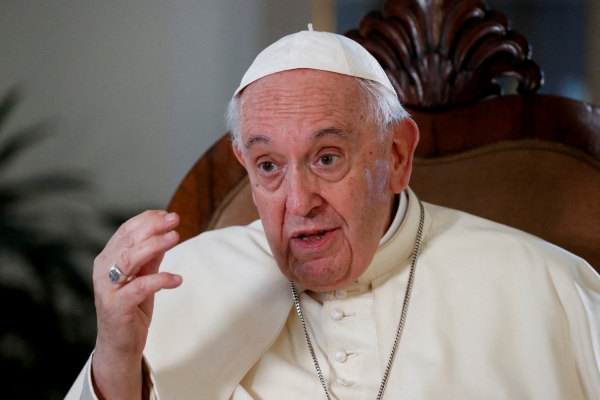 Pope Francis speaks during an exclusive interview with Reuters, at the Vatican 2 July 2022.;
Credit: Remo Casilli / Reuters
Pope Francis speaks during an exclusive interview with Reuters, at the Vatican 2 July 2022.;
Credit: Remo Casilli / Reuters
VATICAN CITY (Reuters) - The Vatican on Thursday 21 July 2022 slammed the brakes on a German progressive movement that aims to give lay Catholics a say in doctrinal matters such as homosexuality and women priests, saying this risked causing a schism in the universal Church.
A short but stern statement said the so-called "Synodal Path" could not assume it had the authority to instruct bishops on doctrine or morality. The movement's co-chairs responded that they made no such claim and expressed surprise.
The movement, a regular gathering of equal numbers of bishops and ordinary German Catholics, has been outspoken in its demands for the Vatican to let priests marry, let women become priests and for the Church to bless same-sex relationships.
Germany's Church, though far from the world's largest, has an outsized influence because of the enormous wealth it derives from publicly collected church taxes. Its largest diocese, Cologne, is wealthier than the Vatican.
The movement "does not have the faculty to oblige bishops and the faithful to assume new forms of governance and new approaches to doctrine and morals", said the statement, which was not signed but experts said could not have been issued without a green light from Pope Francis.
"It would not be lawful to initiate in the dioceses, prior to an agreed understanding at the level of the universal Church, new official structures or doctrines, which would represent a wound to ecclesial communion and a threat to the unity of the Church," it said.
The movement alarmed conservatives and moderates in Germany and in the worldwide Church who feared that it could lead to massive splintering similar to what happened in Anglican and Protestant Churches after they introduced similar changes in recent decades.
"The Church in Germany won't go its own 'German Way'," said Bishop Georg Baetzing, chair of Germany's Bishops' Conference and Irme Stetter-Karp, chair of the Central Committee of German Catholics, in a joint response, adding that they had a duty to say where they thought changes were needed.
They expressed "wonderment" at the Vatican's decision to address them in an "unsigned statement" rather than enter dialogue, something that they said testified to poor communication within the Church.
At a congress in February, the movement's 115 clerics and 115 lay members from the Central Committee of German Catholics also voted in favour of letting priests marry and said sex within a same-sex marriage should not be regarded as sinful.
The Catholic Church teaches that priests should be celibate, that women cannot be priests because Jesus chose only men as his apostles and that while same-sex attraction is not sinful, homosexual acts are.
The German Synodal Path also says non-clerics should have more say on the appointment of bishops - a sensitive demand in a country where many of the faithful are disillusioned at clumsy handling by Church officials of cases of clergy sexual abuse.
The statement said that if national Churches went their own way, there was a risk that they would "weaken, rot and die".
Any eventual changes would have to be part of the universal Church's own synodal path, the statement said, referring to consultations currently taking place around the world ahead of a meeting of bishops in Rome next year. The German movement said in their statement they would make submissions to this.








